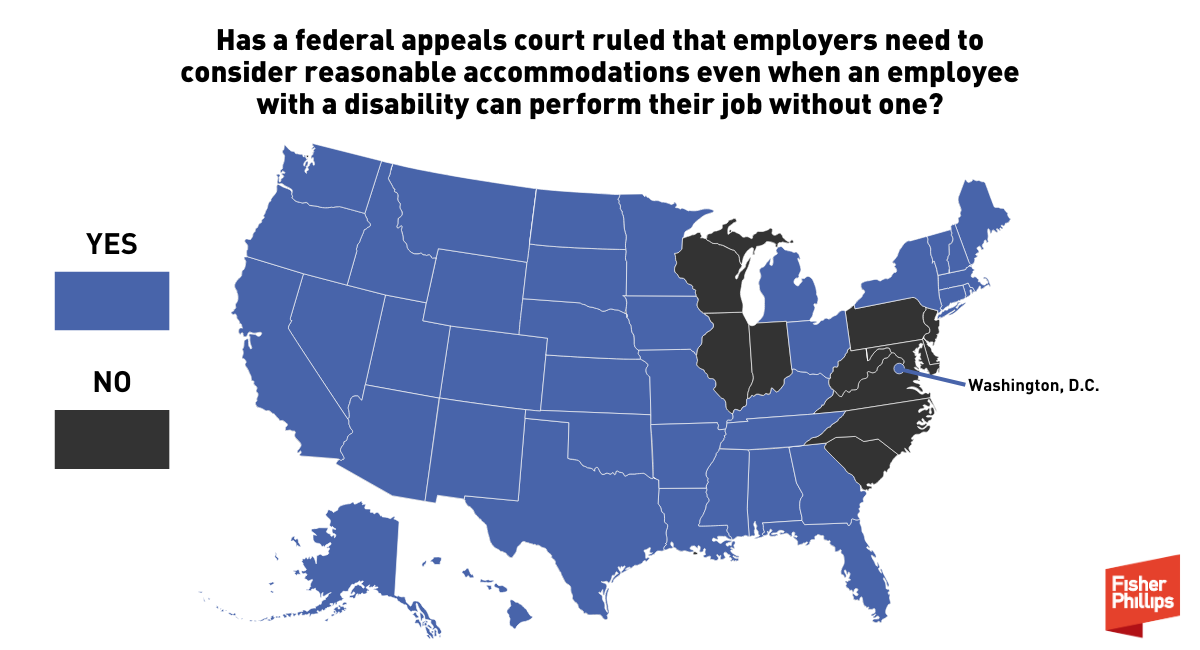Workers Who Can Still Perform Job Without Accommodation Permitted to Advance ADA Claim: What Employers Need to Know
Insights
4.08.25
A federal appeals court recently clarified that an employee may qualify for a reasonable accommodation under the Americans with Disabilities Act (ADA) even if they can perform essential job functions without such an accommodation. The 2nd Circuit’s March 25 decision in Tudor v. Whitehall Central School District reinforces that the ability to perform essential job functions is relevant – but not decisive – in ADA failure-to-accommodate claims. What do employers need to know about this case?
PTSD Diagnosis Leads to Accommodation Request
- Angel Tudor was a teacher in Upstate New York’s Whitehall Central School District. Because she suffered from post-traumatic stress disorder (PTSD), Whitehall initially granted her an accommodation in 2008 and allowed her to take short breaks off school grounds during prep periods to help her manage her symptoms.
- However, when a new school administration took over in 2016, it prohibited teachers from leaving school grounds during prep periods. Despite informing the administration of her longstanding accommodation, Tudor faced disciplinary action for insubordination when she continued to attempt to take breaks off school property.
- After a leave of absence, Tudor returned to work in 2017 and again requested an accommodation. Whitehall provided Tudor with a modified break accommodation and had another staff member cover her students. This arrangement continued for a few years until the 2019-2020 school year when no other staff were available to cover Tudor’s break.
- Regardless, Tudor continued to leave school grounds for her break during her study hall period as students were remote during the pandemic. Because the employee felt she was violating school policy, her breaks heightened her anxiety.
Lawsuit Initially Hits a Dead End
Tudor sued, claiming Whitehall’s refusal to guarantee her a 15-minute afternoon break each day during the 2019-20 school year violated the ADA and New York State law. During the litigation, Tudor admitted she could perform the essential functions of her job even without the additional accommodation, though under great duress and psychological harm. The lower court ruled against Tudor in 2023 because of this admission, holding that she could not prove she was entitled to a reasonable accommodation.
Appeals Court Rules in Favor of Teacher
The 2nd Circuit Court of Appeals vacated this decision on March 25 and sent the case back to the lower court for further proceedings. It emphasized that an employee may qualify for a reasonable accommodation under the ADA even if they can perform essential job functions without it.
The third prong of establishing an ADA failure-to-accommodate claim requires the plaintiff to show they are otherwise qualified to perform the essential functions of the job, with or without reasonable accommodation. Accordingly, the appeals court said, it was not fatal to Tudor’s claim, alone, that she could perform the essential functions of her job without a reasonable accommodation. Rather, it said, Whitehall was required to offer a reasonable accommodation to any employee with a disability if that employee was capable of performing the essential functions of their job with or without the accommodation (absent an undue hardship).
Employers Across the Country Should Take Note
While this case covers those employers in the 2nd Circuit’s jurisdiction (New York, Connecticut, and Vermont), the appeals court noted that this decision did not break new ground. In fact, it noted that cases from all sister circuits that have decided the issue have reached the same conclusion. The full listing of federal appeals courts which have found the ability to perform essential job functions without an accommodation is not fatal to an employee’s ADA or Rehabilitation Act failure-to-accommodate claim as cited by the court:
|
ADA Should Have a Broad Interpretation
The court also noted that the ADA is a remedial statute that should be broadly interpreted to meet its intended purpose to eliminate discrimination against individuals with disabilities. Requiring that an accommodation be strictly necessary to be reasonable would contradict this purpose, it said.
If Congress had wanted employers to make only necessary accommodations, rather than reasonable ones, it could have said so. But Congress did not require “necessary accommodations”; the ADA plainly directs employers to make “reasonable accommodations.”
Therefore, an employee with a disability is entitled to a reasonable accommodation under the ADA, even if it is not strictly necessary or even if they can perform essential job functions without one.
What Should You Do?
Employers should take note of this decision as it underscores the importance of considering reasonable accommodations even when an employee with a disability can perform their job without them. You must carefully evaluate accommodation requests and ensure your HR representatives and leaders are making informed, reasoned decisions in compliance with applicable laws.
This is particularly important if your business or employees are in New York, New York City, and other local jurisdictions where standards for disability discrimination claims are more lenient under their human rights laws. Understanding and adhering to these legal requirements is essential to creating a workplace that’s both inclusive and compliant with the law.
Conclusion
We will continue to monitor court decisions affecting your business. Make sure you are subscribed to Fisher Phillips’ Insight System to get the most up-to-date information directly to your inbox. If you have questions about whether your policies or procedures comply with this decision, contact your Fisher Phillips attorney, the authors of this Insight, or any attorney in our New York City office.
Related People
-
- Amanda M. Blair
- Associate
-
- Brian J. Gershengorn
- Co-Regional Managing Partner


